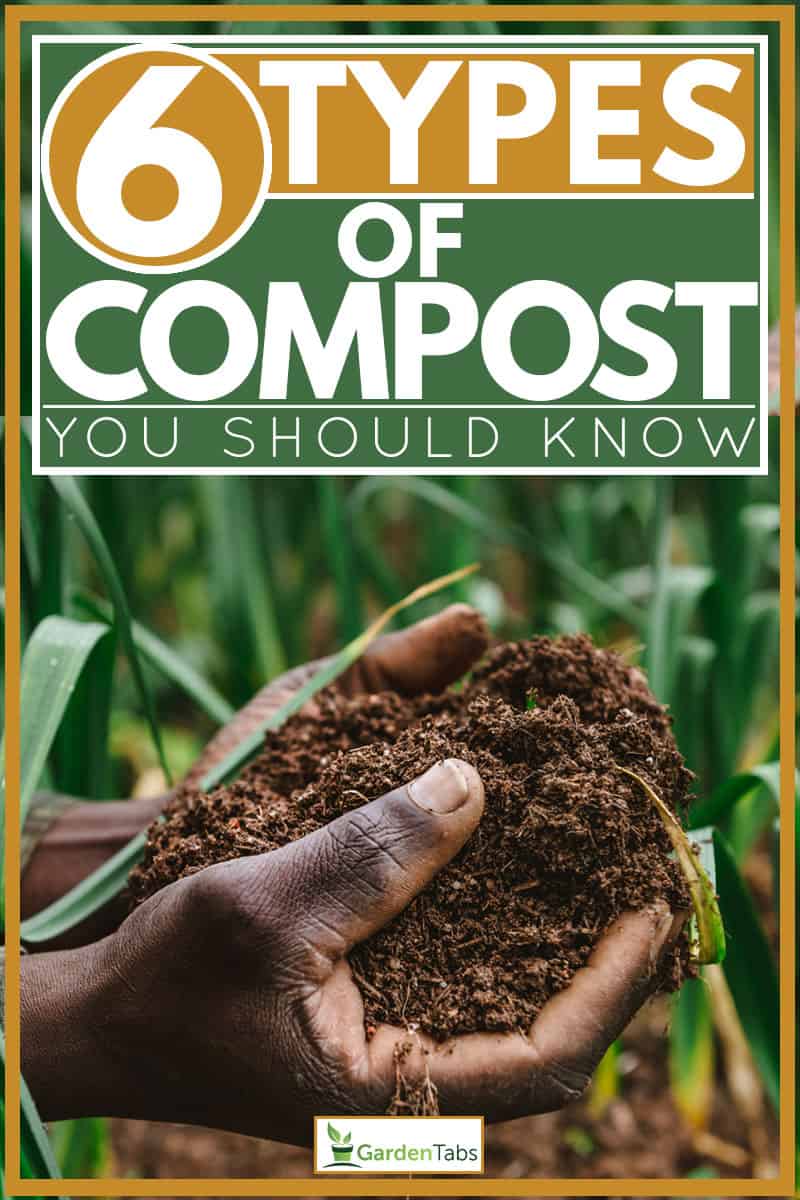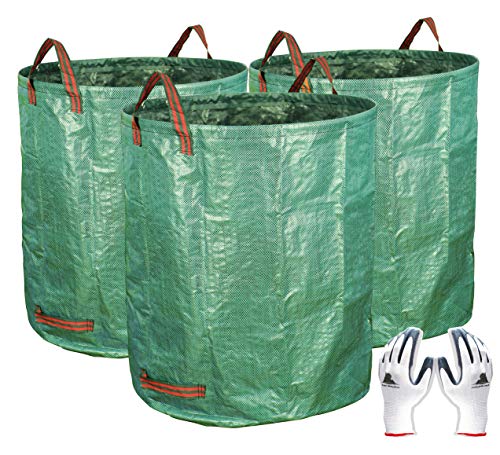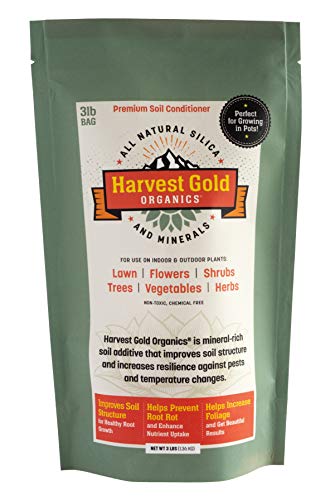This article was reviewed by Steve Snedeker, professional landscaper.

A successful compost pile relies on a delicate balance of organic materials, and the right conditions of oxygen, moisture, and temperature for decomposition to occur. Depending on how you want to use the compost, and what materials you choose (or have available) to use, you can create various types of compost.
By combining the organic materials that are ‘green,’ or nitrogen-rich, and ‘brown’ or carbon-rich organic materials, all you’ll need is a bit of patience for your compost pile to generate a nutrient-filled, natural fertilizer. If you do not have a compost pile, you can still make an environmentally friendly choice from several types of compost sold commercially.
We’ve researched several types of compost to learn the pros and cons of each. Keep reading to find the right compost for your garden.
Contents
1. Yard Trimmings and Leaves
An aerobic, on-site composting method uses yard trimmings and leaves and yields a simplistic, yet effective type of compost. This can be as easy as tilling grass clippings back into the yard or designating a location to pile twigs, wood chips, leaves, grass, weeds, and garden trimmings.
Pros
- Low cost.
- Efficient; viable compost within two months.
- Reduces yard waste in an environmentally friendly way.
- It can be used as mulch and fertilizer.
- Increases water retention and adds nutrients to the soil.
Cons
- The amount of trimmings and leaves available will be affected by changing seasons.
- If used as potting soil, stray grass seed and weeds can germinate.
Get your backyard compost started after reading our blog, “Compost Pile VS Bin - Which is Right for You?”
2. Manure
There are two types of manure compost; animal feces and green manure, or the process of mulching withered crops into soil. Both types are advantageous for soil enrichment. Here, we’ll discuss the pros and cons of composting manure, or animal feces, because it is most widely used among domestic gardeners.
Manure can be composted by adding organic materials such as straw, leaves, shredded paper, and lawn clippings. Alternatively, small quantities of manure can be added directly to your garden. A large area for your compost pile works best because fresh manure can be bulky for both transporting and handling. Manure compost enriches the soil with nitrogen, phosphorous, and potassium.
Pros
- Low cost.
- Reduces agricultural waste in an environmentally friendly way.
- Composting manure kills parasites.
- Composting manure eliminates the potential for undigested seeds to germinate after manure is added to your garden.
- Efficient; viable compost within two months.
- Improves water retention, aeration, and nitrogen of soil.
Cons
- Inconvenient handling.
- Pungent odors.
- Nutrient levels vary depending on animals’ diets.
3. Mushroom Compost
Mushroom compost is a nutrient-rich, sterile substrate. It is used primarily for growing mushrooms commercially. Although the mushrooms strip most nutrients from the compost, after being harvested, the compost can be recycled for garden use.
The organic materials used to make mushroom compost will vary slightly depending on the manufacturer. Typically, materials like wheat or rye straw, horse or chicken manure, gypsum, peat, cottonseed meal, and grape clippings are mixed to compost.
Pros
- Increases water retention and adds nutrients to the soil.
- Reduces agricultural waste in an environmentally friendly way.
Cons
- The high content of soluble salts can kill germinating seeds and young, salt-sensitive plants.
4. Vermicomposting
Vermicomposting is the process of letting earthworms decompose organic materials by eating and digesting the material, to produce excrement called casting. Various earthworm species like red wigglers, tiger worms, and branding worms can be used. Vermicomposting castings are full of nutrients and particularly useful as potting soil.
It is important to note that to maintain vermicompost, you must also keep the earthworms alive and healthy. You must provide bedding for the earthworms, a moistened substrate, and a dark, temperate environment. Worms can be fed organic materials like lawn trimmings, manure, fruit and vegetable waste, grains, coffee grounds, and paper.
Pros
- Ideal for limited space and indoor composting.
- Efficient; viable compost within four months.
- Increases water retention and adds nutrients to the soil.
- It enhances plant growth and crop yield.
Cons
- Worms are sensitive to extreme temperatures; optimal temperature range 55°F to 77°F.
- Worms are sensitive to direct sunlight; they require a shaded location.
- Avoid adding citrus fruits to the compost pile because too much can be toxic to earthworms.
- Avoid adding dairy products to the compost pile.
- Avoid adding meat to the compost pile.
5. Vegan Compost
Vegan compost prioritizes the recycling of plant waste, with zero disruption to the environment. By combining fruit and vegetable scraps, coffee grounds, weeds, grass clippings, wilted crops, wood chips, and leaves, you can achieve a DIY vegan compost pile.
Click here to find this on Amazon.
Commercially made vegan composts avoid the use of any manure and peat.
Pros
- Reduces agricultural waste in an environmentally friendly way.
- Relatively odorless.
- Adds nutrients to the soil.
Cons
- It is challenging to achieve 30:1 nitrogen to carbon ratio.
- It is a slow process, viable compost within six months.
6. Organic Compost
Although compost is created by using organic materials, not all types of compost are certified organic. Simply defined, organic materials are any part of a plant or animal that contains carbon.
To be certified organic for agricultural purposes, the USDA regulates that compost:
- Must contain organic materials obtained from non-synthetic, approved plant material and feedstocks, containing no pesticides, herbicides, or other synthetic materials.
- Raw manure must meet USDA requirements.
- Must maintain a temperature between 131°F and 170°F for three days (or 15 days for windrow composting systems).
The best way to ensure your compost is certified organic is to make it yourself. Or look for “certified organic” when you purchase commercial compost.
If DIY compost isn’t an option for you, check out our blog, “Where to Buy Compost [Top 40 Online Stores]”
Why is Compost pH Important?
Monitoring the pH level of your compost pile is unnecessary, but it can be important because the pH level tells you how quickly the compost is decomposing. Composting is most efficient when microorganisms are provided acidic to neutral conditions. The pH level will vary throughout the decomposition process.
Knowing the pH level of the soil that you are fertilizing can also be beneficial, because some plants, like blueberries and hydrangeas, prefer acidic soil. If the soil structure has a high or low pH, you can attempt to adjust it by adding compost.
Neutral Compost
Compost that has fully decomposed will have a pH level between 6 and 8, either neutral or slightly alkaline.
Acidic Compost
Compost is most acidic during the initial stages of decomposition. But, a high acidity pH reading of 6 or lower can also indicate that your compost does not have enough oxygen. The acidity will slow the decomposition process, so aerating the compost pile should help.
Nurture a flourishing yard and garden with the best type of compost for your home.






